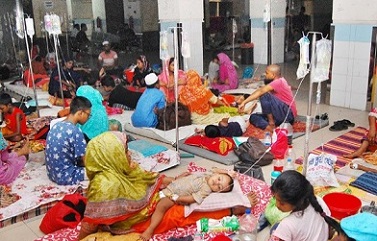Dengue Crisis In Bangladesh Worsens As Many Die And Hospitals Now Facing Shortage Of Saline For Intravenous Drips!
Thailand Medical News Team Aug 08, 2023 1 year, 8 months, 1 week, 2 days, 22 hours, 34 minutes ago
Dengue News: Bangladesh is currently grappling with the most severe dengue fever outbreak in its history, as the mosquito-borne disease continues to wreak havoc across the nation. This year alone, the dengue outbreak has led to over 300 fatalities, exposing the vulnerabilities of the country's healthcare system and triggering urgent calls for a more cohesive response to the escalating crisis.

The country recorded 62 deaths and 14,900 cases in the first six days of August. The figures are way too frightening compared to those over the same period last month, which was then dubbed the deadliest month given this year’s dengue outbreak.
With a total of nearly 63,700 reported cases, this year has marked the deadliest episode since Bangladesh began tracking dengue outbreaks in 2000. The majority of these casualties have been concentrated in Dhaka, the densely populated capital, where hospitals are grappling to accommodate the surging influx of patients.
The World Health Organization (WHO) has noted that approximately half of the global population is now under the threat of dengue, which is intricately linked to the changing climate. The escalating global temperatures and heightened moisture content in the atmosphere due to climate change create ideal breeding conditions for mosquitoes, exacerbating the dengue situation.
Dr Raman Velayudhan, who leads the WHO's program for neglected tropical diseases, emphasized the need for concerted efforts to mitigate the impacts of climate change on the proliferation of dengue.
Dengue, at its worst, can lead to high fevers, severe organ failure, and even death. The virus has four distinct strains, and a second infection with a different strain elevates the risk of severe dengue.
In Bangladesh, the number of patients suffering from dengue-related symptoms has surged, with nearly 2,500 individuals admitted to hospitals across the country as of last weekend. The Health Ministry's response includes expanding bed capacities in major public hospitals to accommodate dengue patients and launching awareness campaigns to encourage preventive measures such as using mosquito nets, eliminating stagnant water, and eradicating mosquito larvae post-rainfall.
Nonetheless, experts are cautioning that the peak of the dengue outbreak in Bangladesh might be on the horizon. Aedes mosquitoes, responsible for transmitting dengue and zika viruses, undergo a breeding surge during the wet season, followed by a dry period when they migrate to urban areas in search of water.
The monsoon season, which typically lasts from June to October, further facilitates their propagation. Dr Mushtaq Hossain, a senior adviser to Bangladesh's Institute of Epidemiology, Disease Control and Research, expressed concerns that the country remains ill-prepared to handle an extended dengue crisis. He warned that the number of dengue patients could continue to escalate until as late as November after the monsoon season, stressing that the virus might pose a year-round risk.
As the dengue situation continues to intensify, the health authorities are grasping for solutions to curb the spiraling crisis. The Directorate General of Health Services (DGHS) is looking to more optimistic times ahead, hoping that the number of patients will gradually decrease by late August.
However, recent data released in yesterday’s
Dengue News coverages in the country paints a grimmer picture, with the death toll climbing by 14 within 24 hours, and an additional 2,751 patients hospitalized. The total number of fatalities for the year has soared to an unprecedented high of 313.
https://www.newagebd.net/article/208806/14-more-die-of-dengue
The dengue outbreak has not only highlighted the critical need for medical attention but also revealed the scarcity of essential medical supplies, such as saline for intravenous drips, in government hospitals. Patients are encountering exorbitant costs while trying to obtain and utilize saline for their treatment. Dr Md Shahadat Hossain, Director of Management Information System at DGHS, emphasized that addressing the saline shortage necessitates collaboration among pharmaceutical companies, drug administration agencies, and other relevant organizations. In response to the situation, the DGHS has initiated funding for public hospitals to independently procure saline, given the failure of Essential Drugs Company Ltd to supply this vital medical resource.
https://www.dhakatribune.com/bangladesh/321804/dengue-outbreak-dghs-eyes-%E2%80%98better%E2%80%99-days-ahead
The dengue crisis in Bangladesh serves as a stark reminder of the multifaceted challenges posed by infectious diseases in an increasingly interconnected world. As climate change accelerates and global travel continues unabated, outbreaks like dengue have the potential to become more frequent and severe. This situation underscores the urgency for international collaboration and comprehensive strategies to combat both the immediate impacts and the long-term consequences of such health crises. While the situation is dire, it also presents an opportunity for governments, health organizations, and communities to unite and establish resilient systems capable of managing and preventing future outbreaks on a global scale
For the latest
Dengue News, keep on logging to Thailand Medical News.
